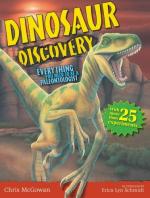|
This section contains 1,639 words (approx. 6 pages at 300 words per page) |

|
Paleontology is the study of plant and animal life in the geologic past. Paleontologists use fossils to study past life forms. They research what early organisms looked like, as well as their environments, their relationships to other life forms, and their correlations with modern species. Paleontology was crucial in building our current understanding of Earth's history. Prior to the birth of paleontology in the early nineteenth century, geologists had no way of determining the relative ages of rocks, but by comparing fossils that represented short-lived life forms, geologists were able to date rock strata more accurately, and put together a chronology of the earth. Paleontology also provided evidence for the theory of evolution.
The French biologist Georges Cuvier (1769-1832) is considered the father of paleontology. Cuvier worked in the Museum of Natural History in Paris around the turn of the eighteenth century, and there he developed a keen...
|
This section contains 1,639 words (approx. 6 pages at 300 words per page) |

|


